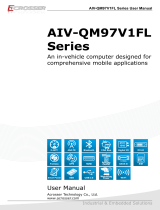Page is loading ...

Application Note
Using Serial I/O with Shared Interrupts under Linux 2.6 kernel
Date: 12/08/2006
Applies to WinSystems Products:
PCM-COM4A and PCM-COM8
Issue Addressed:
How to configure Linux to work with the shared interrupt mode on the PCM-COM4A and PCM-
COM8
Solution:
Starting with kernel version 2.6, Linux changed the built-in support for at least some standard
serial boards with shared interrupt capability. The kernel must have been built with the “Extended
dumb serial driver options“ enabled. (See the Serial-HOWTO for additional information) Make
sure that your kernel build includes these features before proceeding with the following
configuration steps.
First, verify that the required device files (ttyS#) exist in your /dev directory. You will probably have
ttyS0 (a.k.a.COM1) through ttyS3 (a.k.a. COM4) but no others. If this is so, use MAKEDEV to
create additional device files, one for each serial port (beyond COM1-COM4) that you will have in
your system. If you have one PCM-COM8 installed, you will want to add devices ttyS4 through
ttyS11, at a minimum. An example follows:
linux# cd /dev
linux# ./MAKEDEV ttyS4
linux# ./MAKEDEV ttyS5
.
.
linux# ./MAKEDEV ttyS11
Next, create or modify the rc.serial file to include the commands from whichever of the following
examples is appropriate:
PCM-COM8 Example
#!/bin/sh
setserial /dev/ttyS4 port 0x138 irq 7 uart 16550A ^fourport
setserial /dev/ttyS5 port 0x140 irq 7 uart 16550A ^fourport
setserial /dev/ttyS6 port 0x148 irq 7 uart 16550A ^fourport
setserial /dev/ttyS7 port 0x150 irq 7 uart 16550A ^fourport
setserial /dev/ttyS8 port 0x158 irq 7 uart 16550A ^fourport
setserial /dev/ttyS9 port 0x160 irq 7 uart 16550A ^fourport
setserial /dev/ttyS10 port 0x168 irq 7 uart 16550A ^fourport
setserial /dev/ttyS11 port 0x170 irq 7 uart 16550A ^fourport
Notes
This example is for a PCM-COM8 with a base address of 0x130 and set to use interrupt 7. The
use of the ^fourport (“not fourport”) switch option may seem counterintuitive but the fourport option
only applies to AST Fourport boards which function differently than WinSystems multiport boards.
You may notice that the uart specified in this example does not take advantage of the deep
FIFOs that are available on the PCM-COM8. This is to maintain consistency between the
provided examples and because the setserial version we tested with did not support 128 Byte
FIFOs.

PCM-COM4A Example
#!/bin/sh
setserial /dev/ttyS4 port 0x100 irq 7 uart 16550A ^fourport
setserial /dev/ttyS5 port 0x108 irq 7 uart 16550A ^fourport
setserial /dev/ttyS6 port 0x110 irq 7 uart 16550A ^fourport
setserial /dev/ttyS7 port 0x118 irq 7 uart 16550A ^fourport
Notes
This example is for a PCM-COM4A configured for Map #4 and set to use interrupt 7. The mask1
value on the last linediffers from the PCM-COM8 board because there are only 4 status bits to
check. The use of the ^fourport (not fourport) switch option may seem counterintuitive but the
fourport option only applies to AST Fourport boards which function differently than WinSystems
multiport boards.
Finally, if you had to create rc.serial, make sure it is executable and in the proper directory so that
it executes whenever you boot your system. To make the file executable, run:
linux# chmod +x rc.serial
Place rc.serial in the same directory as rc.local which should be resident on most systems.
Reboot so that Linux initializes the ports and you're done. If you want to check to be sure that the
ports were initialized properly, run setserial with the –a option to report the status of each port. For
example:
setserial –a /dev/ttyS4
To verify that the ports are functional, you may try something simple like using echo to send a text
string to another machine running a terminal program. Another simple test is to use minicom to
send/receive files sent from another machine.
For additional information about multiport serial I/O, see the Serial-HOWTO available at
http://www.tldp.org. For
information on minicom, run man minicom..
Tested Version(s):
SimplyMepis 3.3, Setserial 2.15, Minicom 1.83.0
If you have questions concerning this Application Note, please contact your Applications Engineer
at
http://www.winsystems.com/sales/contacts1.html.
/





